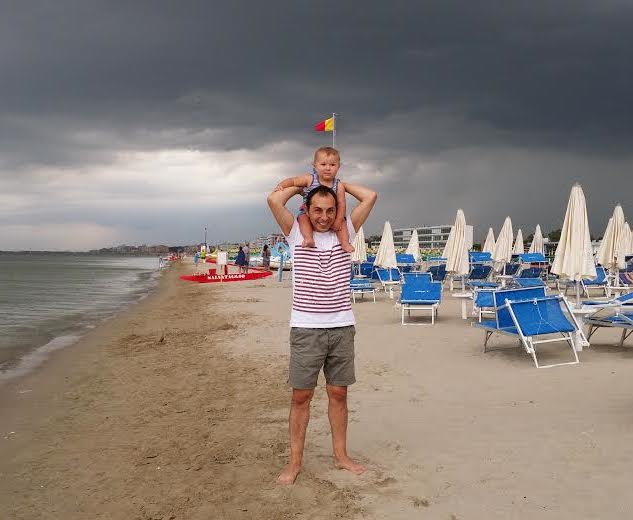
My Story, Our Story: Paolo Fattorini
15 December 2015BBS Alumni talk about themselves: what was before, what came after and the memories of the student’s life, to offer a personal story and a narration of one’s own professional experience. For a history of our Community. The protagonist of the XIII episode is Paolo Fattorini, Product Manager Johnson & Johnson Medical, MBA distance learning 2011/2013.
Paolo’s soundtrack is: Viva la Vida, Coldplay.
Ouverture
“I’m lucky, I don’t believe in a clear-cut, ‘square’, finished work. I see this type of attitude (if we write this, I’m done as for my collaboration with engineers) in some colleagues, while for me it’s completely new, every time.” Paolo’s tone is always peaceful and streamlined. It’s not a chance he defines himself a facilitator.
The story so far
After a degree in veterinary medicine, Paolo worked as a freelance for two-three years. “Then I discovered that almost all vets become depressed by the time they are 45, so I granted myself the possibility of entering the corporate world.”
Paolo started working as a pharmaceutical representative. He wished to move from a fixed-term contract to an open-ended one, and he managed to do it changing the company he worked for. He remained at Johnson & Johnson for three years, then he went to work for a competitor to cover a role straddling sales and marketing, working for Medtronic, for about two years. At that point, he went back to Johnson & Johnson to take part in a new, challenging project. “I completed my transformation after the Master: I became Product Manager, in charge of the Italian domestic market. I’m currently in charge of Marketing, from our Roma headquarters.”
Why BBS
“BBS’s offer was the best for someone with a little, previous knowledge such as I was. I’d spoken with someone who was attending the MBA and his words did it for me. The cost/effectiveness ratio was rather appealing to me.” Paolo believes that his company has increasingly given him more responsibilities not just for the skills he acquired, but also because he demonstrated he was able to take on and bring about a parallel commitment to his job, investing in himself.
Among the best aspects of his experience at Villa Guastavillani, Paolo mentions the relationship with the other course participants. “I met people with whom I’ve kept in touch. We cover different positions and we operate in different businesses, but our exchange of experiences and stories keeps on providing a mutual enrichment.”
Being a facilitator
The exchange of experiences is fundamental to Paolo, also in his everyday work life. “It’s important to find the motivation in daily actions. In my professional life, it’s my colleagues’ expressions of appreciation that flatter me: yesterday, a colleague told me I helped him achieve concrete results.” Paolo knows well the work of “pure” sales associates and of the pharmaceutical representatives, because he was one for several years. “I’d like to be a support for other peoples’ work. I’m a processing point for the data collected from the territory, the market and the rest of Europe, in order to develop strategies that are suitable for the Italian market. I provide tools and guidelines to those who operate in sales, to support their actions and make them more efficient.”
Despite this, for Paolo only 60% of his job is done with others. “The difficult bit of my job is finding the time to work alone”. How does it work?
“While I’m at the office, I’m always with someone, I’m never at my desk. I must take the opportunity of using my home office and isolate myself physically.” Paolo travels extensively across Italy, for professional reasons, the starting base being in Pratica di Mare. After about a year in Rome, the company granted him the possibility of commuting with Romagna [as in Emilia-Romagna, a region in the north of Italy, where Bologna and BBS are located] to be with his family. “I take advantage of the moments when I can be with my wife and my sixteen-month son, Edoardo Manfredi, to perform the solitary part of my job. At times I even disconnect my cell phone.”
(Editor’s Note)
I ask what inspires him, whether he has a personal pantheon of reference or a book he considers to be relevant for his education and training. Once again, he proves to be on the rational side: “I get inspired by people, friends and colleagues, but mostly my father and siblings, their balance, their being sound and resolute people, who always know how to face a situation.” I delve deeper into this topic and I discover a patch of insecurity, a mood that is also an important developmental resource: feeling inadequate. “It’s the real difficulty, the feeling of being outside one’s own comfort zone. It used to happen quite often; now, less and less. When one changes, one would always like to feel ready, but it is this gap between what one’s able to do and what the new situation requires that allows one to grow.”
A piece of advice to a student
“Have fun whilst you attend the Master, still take it very seriously. The days and the time you devote to your training won’t come back. As for fun, my advice is to find friends among the other course participants: with them, you’ll be able to go on growing also beyond the end of the course, thanks to a continuous exchange.”
Do you want to read more stories from the BBS Alumnae and Alumni Community? Click here.
